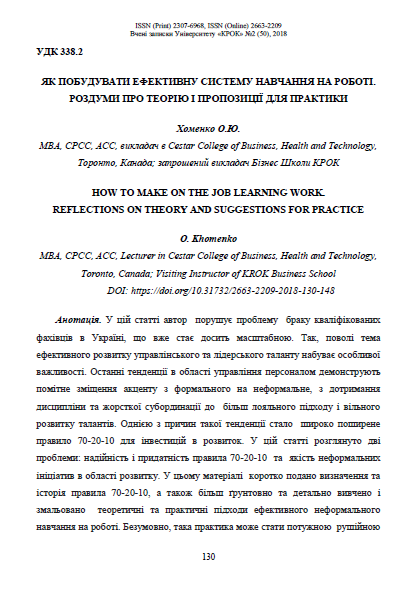How to make on the job learning work. Reflections on theory and suggestions for practice
DOI:
https://doi.org/10.31732/2663-2209-2018-50-130-148Keywords:
a path to change, innovations in the field of development, practical experience of revealing talent, advice to managers, advice to personnel management specialists, effective training at work, recent trends in the field of HR, development of managerial and leadership talentAbstract
The shortage of the qualified professionals in Ukraine is becoming a widely discussed issue (Pavlushenko, 2018; personal communications with clients). Subsequently, the topic of effective development of the managerial and leadership talent has grown in importance. Recent HR trends demonstrate a noticeable shift of focus from formal to informal talent development [1]. One of the reasons stated is the widely popular 70-20-10 rule for development investment. This article aims to consider two concerns: the robustness and applicability of the 70-20-10 rule and the quality of the informal development initiatives. I will first briefly discuss the definition and history of the 70-20-10 rule and then discuss potential theoretical and practical approaches of effective informal learning on the job. This article is intended as an opening of a debate between scholars and practitioners on effective ways to develop talent. The material and conclusions discussed here may be a useful introduction to this topic for both non-HR managers and development professionals.
Downloads
References
Pavlushenko T. (2018, October 2). Дефицит кадров: как компании борются с кадровым голодом. [Defisit kadrov: kak kompanii boryutsya s kadrovym golodom.]. Retrieved from https://biz.liga.net/hr/all/article/defitsit-kadrov-kak-kompanii-boryutsya-s-kadrovym-golodom.
Clardy A. (2018). 70-20-10 and the Dominance of Informal Learning: A Fact in Search of Evidence. Human Resource Development Review, 17(2), 153-178. doi:10.1177/15344843/8759399.
Loew L. (2015). The state of leadership development 2015: The time to act is now. BrandonHall Group. Retrieved from http://www.ddiworld.com/DDI/media/trend-research/state-of-leadership-development_tr_brandon-hall.pdf.
Mitchel C., Ray R.L., & van Ark B. (2017). The Conference Board CEO challenge 2017: Leading trough risk, disruption, and transformation. The Conference Board. New York, NY. Retrieved from https://www.conference-board.org/publications/publicationdetail.cfm?publicationid=7447.
Feser C., Halbeisen, T. & Lane, K. (2014). What’s missing in the leadership development. McKinsey Quarterly. Retrieved from https://www.mckinsey.com/featured-insights/leadership/whats-missing-in-leadership-development.
Edmondson A. C. (2019). The fearless organization. Creating psychological safety in the workplace for learning, innovation, and growth. Hoboken, NJ: Wiley & Sons, Inc.
McCauley C. (2013, November 13). My love-hate relationship with 70-20-10 [Blog post]. Retrieved from http://www.experiencedrivendevelopment.com/my-love-hate-relationship-70-20-10.
Scott S., & Ferguson, O. (2014). New perspectives on 70-20-10. Good Practice. Retrieved from http://www.cedma-europe.org/newsletter%20articles/misc/New%20Perspectives%20on%2070-20-10%20(Nov%2014).pdf.
Catino M., & Patriotta, G. (2013). Learning from errors: Cognition, emotions and safety culture in the Italian Air Force. Organization Studies, 34, 437-467. doi:10.1177/0170840612467156.
Mansoori Y. (2017). Enacting the lean startup methodology. International Journal of Entrepreneurial Behavior & Research, 23, 812-838. doi:10.1108/ijebr-06-2016-0195.
Kolb D. A., Boyatzis, R. E., & Mainemelis, C. (2000). Experiential learning theory: Previous research and new directions. In R. J. Sternberg & L. F. Zhang (Eds.), Perspectives on cognitive, learning, and thinking styles. Mahwah, NJ: Erlbaum.
Kolb D. A. (2015). Experiential learning. Experience as the source of learning and development (2nd ed.). Upper Saddle River, NJ: Pearson Education.
McCauley, C. D., & McCall, M. W., Jr. (Eds.). (2014). Using experience to develop leadership talent: How organizations leverage On-the-job development. San Francisco, CA: Wiley.
Matsuo M. (2015). A framework for facilitating experiential learning. Human Resource Development Review, 14, 442-461. doi:10.1177/1534484315598087.
Day D. V., & Dragoni, L. (2015). Leadership development: An outcome-oriented review based on time and levels of analyses. Annual Review of Organizational Psychology and Organizational Behavior, 2(1), 133-156. doi:10.1146/annurev-orgpsych-032414-111328.
Cunliffe A. L. (2016). “On becoming a critically reflexive practitioner” redux: What does it mean to be reflective? Journal of Management Education, 40, 740-746. doi:10.1177/1052562916668919.
Schippers M. C., Edmondson, A. C., & West, M. A. (2014). Team reflexivity as an antidote to team information-processing failures. Small Group Research, 45, 731-769. doi:10.1177/1046496414553473.
Van den Hout J. J. J., Davis, O. C., & Weggeman, M. (2018). The conceptualization of team flow. Journal of Psychology, 152, 388-423. doi:10.1080/00223980.2018.1449729.
Tse D. C. K., Fung H. H., Nakamura J., & Csikszentmihalyi M. (2016). Teamwork and flow proneness mitigate the negative effect of excess challenge on flow state. The Journal of Positive Psychology, 13, 284-289. doi:10.1080/17439760.2016.1257059.
Aube C., Rousseau V., & Brunelle E. (2018). Flow experience in teams: The role of shared leadership. Journal of Occupational Health Psychology, 23, 198-206. doi:10.1037/ocp0000071.
Heslin P. A., & Keating L. A. (2016). In learning mode? The role of mindsets in derailing and enabling experiential leadership development. Leadership Quarterly, 28, 367-384. doi:10.1016/j.leaqua.2016.10.010.
Porter C. O. L. H., Franklin D. A., Swider, B. W., & Yu, R. C.-F. (2016). An exploration of the interactive effects of leader trait goal orientation and goal content in teams. Leadership Quarterly, 27, 34-50. doi:10.1016/j.leaqua.2015.09.004.
Hezlett S. A. (2016). Enhancing experience-driven leadership development. Advances in Developing Human Resources, 18, 369-389. doi:10.1177/1523422316645887.
Harvey M., Moeller M., & McPhail R. (2017). Mentoring female global leaders: A social comparison perspective. South Asian Journal of Human Resources Management, 4, 21-41. doi:10.1177/2322093717705027.
Yip J., & Kram, K. E. (2016). Developmental networks: Enhancing the science and practice of mentoring. In D. A. Clutterbuck, F. Kochan, L. G. Lunsford, N. Domingez, & J. Haddock-Millar (Eds.), The Sage Handbook of Mentoring (pp.88-104). Thousand Oaks, CA: Sage.
Opengart R., & Bierema, L. (2015). Emotionally intelligent mentoring. Human Resource Development Review, 14, 234-258. doi:10.1177/1534484315598434.
Dunn M. E. (2017). Early career developmental networks and professional’s knowledge creation. Journal of Management. Advance online publication. doi:10.4119727/016439210763710772022118.


